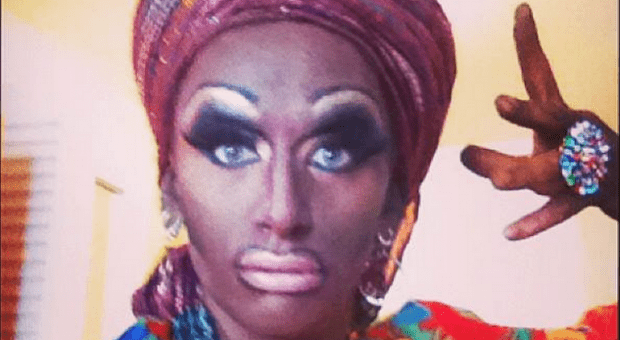Toronto drag artist Daytona Bitch has been fired as the TD Canada Trust Pride drag queen following a recent performance in which she wore what some are calling “blackface.”
Bitch says she received the news in an email on June 26 that said she will not be performing on the Pride Toronto (PT) stages after PT’s director of development, Ben Freeman, placed a call to the marketing company that booked her gig. The email from Diamond Integrated Marketing states that Bitch’s recent performance was “not at all well received by the LGBT community” and is contrary to TD’s “longstanding commitment to diversity.”
Bitch says she was devastated to learn her Pride schedule is now wide open, which means a big financial hit for the popular drag performer.
The performance in question, which generated plenty of angry discussion on social media, took place at Crews & Tangos on June 24. Bitch was a judge for Drag Race, and the theme was Caribbean Heat, she says.
Bitch dressed as Miss Cleo, an American “psychic” who achieved fame as a spokesperson for a psychic hotline from 1997 to 2003. She planned to read people’s fortunes as part of her act. But before the end of the night, photos were already circulating on Facebook with some calling the performance a “racist minstrel show.”
Bitch doesn’t see it that way. “I asked a couple people if it was offensive because it’s not blackface in my eyes,” she says. “I went to theatre school. I know what blackface is. It was not a minstrel show. I was doing a character.
“The people I asked at Crews & Tangos thought it was hilarious that I was dressed as a big fat black woman.”
Bitch wants “to apologize to those I offended,” but she is now worried about “physical threats” she received on social media. “Now I don’t feel safe walking down the street,” she says. “I’ve had a couple threats from people.”
Ivory Towers — another drag queen who joined Bitch onstage June 24 and performed with “tribal makeup” — has also been under fire on social media. She, too, maintains she did not perform in “blackface” and says she is an artist who uses makeup and costumes as part of her art. Towers says it’s not the first time she’s portrayed that look, and she does not regret it.
“Wearing tribal makeup is not racist,” she says. “People do tribal makeup in makeup school, and other drag queens have done tribal makeup. People wear tribal makeup on Halloween. It has nothing to do with being racist or attacking black people. To me, drag is an escape from reality . . . I am an artist and the least racist person that there is. I don’t regret it.”
But Rinaldo Walcott, associate professor and chair of the Department of Sociology and Equity Studies in Education at the University of Toronto, says cultural appropriation can be very traumatizing for some people, especially people with a long history of being victimized for the way they look.
“There is no excuse by any artist, particularly a white artist, in 2013, to do blackface,” he says. “I think it even strains the imagination for black artists to do it, too. So [Bitch] should really have asked, what did she think this was going to achieve?”
However, as a drag artist whose character is considered crass and shocking, Bitch says she frequently walks the line on what is considered offensive — and sometimes crosses over it. “I feel that drag is supposed to be controversial, and it has been from the start,” she says. “The line exists to slightly dip your toe over. Maybe I went a little too far. I didn’t think I went too far.
“The question of when is it art and when is it crossing the line can never be answered because art is all self-expression and all based on opinion. It’s a question that can never be answered.”
Walcott says that calling something art doesn’t take away accountability and responsibility. “Art can absolutely shock, but the viewers and the critics have a responsibility to say if it’s good art, bad art or art that is forcing stereotypes and forms of discrimination,” he says. “Calling it art doesn’t take away the ethical and moral requirements of the work.”
Alphonso King, who is a DJ at Crews & Tangos and performs in drag as Jade Elektra, says he sees a lot of racism in drag culture, as well as the wider queer community.
Last year, local drag artist Donnarama was criticized for a performance some called Islamophobic. In the show, Donnarama danced to songs by the Pussycat Dolls and Katy Perry wearing a burka and a bindi spot on her forehead, with a “corset made of dynamite sticks” strapped to her stomach.
“There’s a whole history of this going on in the gay community; not just in Toronto, but all over,” King says. “When I saw the picture of Daytona, I wasn’t really surprised, because I know Daytona’s character. But then I saw the hashtag, which actually said ‘racist.’”
King says a photo shared by Bitch tagged “#racist” indicates that she is well aware that what she did is racist. “That was the most offensive part for me,” he says. “For her to say it’s just art is simply not true. She took it one step further and actually acknowledged the racism.”

 Why you can trust Xtra
Why you can trust Xtra


